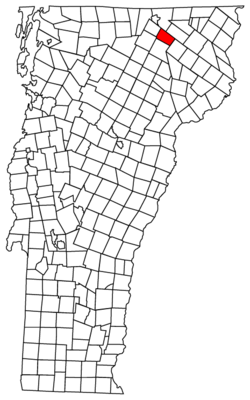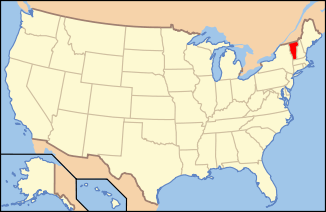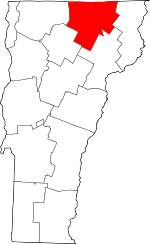Brownington, Vermont
Brownington is a town in Orleans County, Vermont, United States. The population was 988 as of the 2010 census.
Brownington, Vermont | |
|---|---|
Town | |
The Old Stone House Museum | |
 Located in Orleans County, Vermont | |
 Location of Vermont with the U.S.A. | |
| Coordinates: 44°49′32″N 72°8′3″W | |
| Country | United States |
| State | Vermont |
| County | Orleans |
| Chartered | October 2, 1790 |
| Settled | 1796 |
| Organized | 1799 |
| Area | |
| • Total | 28.4 sq mi (73.6 km2) |
| • Land | 28.3 sq mi (73.3 km2) |
| • Water | 0.1 sq mi (0.4 km2) |
| Elevation | 1,025 ft (342 m) |
| Population (2000) | |
| • Total | 885 |
| • Density | 31.3/sq mi (12.1/km2) |
| • Households | 337 |
| • Families | 239 |
| Time zone | UTC-5 (EST) |
| • Summer (DST) | UTC-4 (EDT) |
| ZIP code | 05860 |
| Area code(s) | 802 Exchange: 754 |
| FIPS code | 50-09850[1] |
| GNIS feature ID | 1462056[2] |
Geography
According to the United States Census Bureau, the town has a total area of 28.4 square miles (73.6 km2), of which 28.3 square miles (73.2 km2) is land and 0.1 square mile (0.4 km2) (0.49%) is water.
Brownington has three unincorporated villages: Brownington, Brownington Center, and Evansville.
The lie of the town is moderate but uneven. The central part of town is somewhat elevated. The Willoughby River flows through the southern part of town. Small streams are found throughout. Brownington Pond is in the north, partly in Derby.
The northeast part of town is delimited from its neighbor, the town of Charleston, by Chilafoux Road, which runs northwest-southeast, for about one-third of its length.[3]
Geology
Rocks are mostly of the calciferous mica schist, except in the southeastern part, where they are granite. A narrow vein of hornblende schist extends through the central part, from north to south.[4]
Local government
Town
- Selectman - Michael Glodgett[5]
- Town Clerk - Valerie Faust
- Tax Collector - Valerie Faust
- Auditor - Joanne Martin
- Member, Planning Board - Roger Samuel
- Second Constable - Renee Falconer
- General Fund Budget - $114,944
- Highway Budget - $352,572
In 2008, the town received its fire department services from the adjacent village of Orleans in the town of Barton.[6]
School District
The local school is part of the OSCU (Orleans Central Supervisory Union). The local school educates students K-8. Brownington pays the OCSU to educate grades 9-12 out of its budget at Lake Region Union High School (#24).
- School Director - Larry Chase
- Principal - Elaine Collins
- Student:Teacher ratio - 12:1 (State average 10:1)
- Budget - $1,915,545
History
The town was named after the family Brown. Two chief grantees of Brownington were Daniel and Timothy Brown. There were six other male Browns and one woman, Sarah.[7]
Until 1816, court convened here, alternating with Craftsbury, both shire towns of the county. After that year, the legislature changed the county seat to Irasburg.
Alexander Twilight built Athenian Hall,[8] now called the Old Stone House[9] as a dormitory for a boarding academy in 1836.[10] It is a museum today.[11]
Part of the museum complex is the Samuel Read Hall House, located on the Hinman Settler Road. This Federal-style building was completed in 1831. For about twenty years it was the home of Hall, a pioneer in the field of American education.[12][13]
The Orleans County Grammar School was moved back to its original location on August 8, 2016, by a team of 46 oxen. The school was built in 1823.[8]
Demographics
| Historical population | |||
|---|---|---|---|
| Census | Pop. | %± | |
| 1800 | 65 | — | |
| 1810 | 236 | 263.1% | |
| 1820 | 265 | 12.3% | |
| 1830 | 412 | 55.5% | |
| 1840 | 486 | 18.0% | |
| 1850 | 613 | 26.1% | |
| 1860 | 761 | 24.1% | |
| 1870 | 901 | 18.4% | |
| 1880 | 854 | −5.2% | |
| 1890 | 799 | −6.4% | |
| 1900 | 748 | −6.4% | |
| 1910 | 760 | 1.6% | |
| 1920 | 741 | −2.5% | |
| 1930 | 697 | −5.9% | |
| 1940 | 689 | −1.1% | |
| 1950 | 673 | −2.3% | |
| 1960 | 599 | −11.0% | |
| 1970 | 522 | −12.9% | |
| 1980 | 708 | 35.6% | |
| 1990 | 705 | −0.4% | |
| 2000 | 885 | 25.5% | |
| 2010 | 988 | 11.6% | |
| Est. 2014 | 969 | [14] | −1.9% |
| U.S. Decennial Census[15] | |||
As of the census[1] of 2000, there were 885 people, 337 households, and 239 families residing in the town. The population density was 31.3 people per square mile (12.1/km2). There were 450 housing units at an average density of 15.9 per square mile (6.1/km2). The racial makeup of the town was 97.06% White, 0.45% African American, 1.24% Native American, 0.23% Asian, 0.34% from other races, and 0.68% from two or more races. Hispanic or Latino of any race were 0.45% of the population.
There were 337 households, out of which 35.0% had children under the age of 18 living with them, 57.3% were married couples living together, 10.4% had a female householder with no husband present, and 28.8% were non-families. 21.4% of all households were made up of individuals, and 8.0% had someone living alone who was 65 years of age or older. The average household size was 2.63 and the average family size was 3.02.
In the town, the population was spread out, with 27.2% under the age of 18, 7.5% from 18 to 24, 28.8% from 25 to 44, 26.4% from 45 to 64, and 10.1% who were 65 years of age or older. The median age was 38 years. For every 100 females, there were 103.4 males. For every 100 females age 18 and over, there were 104.4 males.
The median income for a household in the town was $29,667, and the median income for a family was $37,721. Males had a median income of $26,210 versus $21,250 for females. The per capita income for the town was $14,004. About 10.8% of families and 17.9% of the population were below the poverty line, including 24.8% of those under age 18 and 25.3% of those age 65 or over.
Cultural events
- "Old Stonehouse Day" in August when the Brownington Village Historic District is open to the public free of charge
- Abenaki Clan of the Hawk:[16]
- One of forty 'places to visit' on Vermont's Northeast Kingdom Geotourism MapGuide[19]
Notable people
- Portus Baxter, US congressman
- James Woodward Strong college president; brother of William Strong
- William Barstow Strong, president of the Atchison, Topeka and Santa Fe Railway; brother of James Strong
- Alexander Twilight, first African American to serve in a state legislature and to receive a degree from an American University
References
- "U.S. Census website". United States Census Bureau. Retrieved 2008-01-31.
- "US Board on Geographic Names". United States Geological Survey. 2007-10-25. Retrieved 2008-01-31.
- "Northeast Kingdom Civil War Roundtable". Northeast Kingdom Civil War Roundtable: 2. July 2014.
- Child, Hamilton. (May 1887). Gazetteer of Lamoille and Orleans Counties, VT.; 1883-1884. Hamilton Child.
- School budget passes, but not without discussion,The Chronicle,March 7, 2007, page 2A
- Creaser, Richard (January 28, 2009). Water budget calls for higher rates. the Chronicle.
- Esther Munroe Swift. Vermont Place-Names: Footprints of History,Publisher: S. Greene Press (July 26, 1996) ISBN 0-8289-0291-7 ISBN 978-0828902915
- "Heavy lifting: 46 oxen guide historic schoolhouse home". Burlington Free Press. 8 August 2016. Retrieved 8 August 2016.
- "Old Stone House Museum - Orleans County Historical Society". www.oldstonehousemuseum.org.
- "retrieved June 30, 2007". historicvermont.org.
- Discover the Barton Area. Barton Area Chamber of Commerce,undated, referenced February 2007
- Creaser, Richard (June 20, 2007). Up in flames is new exhibit at Old Stone House. the Chronicle.
- Times Argus: Kingdom Archived 2012-02-25 at the Wayback Machine, 26 July 2009
- "Annual Estimates of the Resident Population for Incorporated Places: April 1, 2010 to July 1, 2014". Archived from the original on 2015-05-23. Retrieved June 4, 2015.
- "U.S. Decennial Census". United States Census Bureau. Retrieved June 19, 2015.
- Clan of the Hawk webpage Archived July 23, 2008, at the Wayback Machine
- Widwind.com retrieved August 4, 2007
- Essaff, Paul (2007). Northeast Kingdom of Vermont. Things To Do & Places to Go. Paul Essaff.
- Travel the Kingdom Archived December 24, 2007, at the Wayback Machine
External links
- Old Stone House Museum A notable building in the Brownington Village Historic District.
